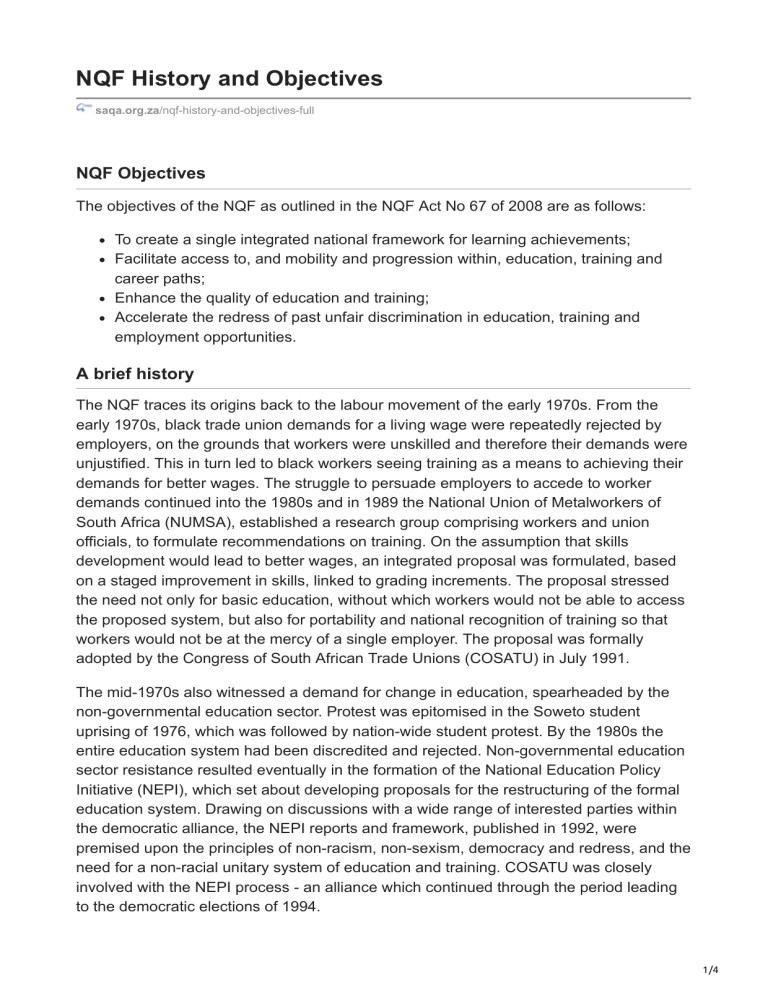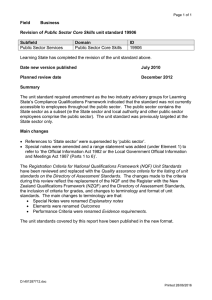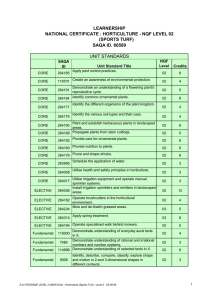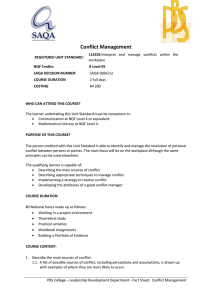
NQF History and Objectives saqa.org.za/nqf-history-and-objectives-full NQF Objectives The objectives of the NQF as outlined in the NQF Act No 67 of 2008 are as follows: To create a single integrated national framework for learning achievements; Facilitate access to, and mobility and progression within, education, training and career paths; Enhance the quality of education and training; Accelerate the redress of past unfair discrimination in education, training and employment opportunities. A brief history The NQF traces its origins back to the labour movement of the early 1970s. From the early 1970s, black trade union demands for a living wage were repeatedly rejected by employers, on the grounds that workers were unskilled and therefore their demands were unjustified. This in turn led to black workers seeing training as a means to achieving their demands for better wages. The struggle to persuade employers to accede to worker demands continued into the 1980s and in 1989 the National Union of Metalworkers of South Africa (NUMSA), established a research group comprising workers and union officials, to formulate recommendations on training. On the assumption that skills development would lead to better wages, an integrated proposal was formulated, based on a staged improvement in skills, linked to grading increments. The proposal stressed the need not only for basic education, without which workers would not be able to access the proposed system, but also for portability and national recognition of training so that workers would not be at the mercy of a single employer. The proposal was formally adopted by the Congress of South African Trade Unions (COSATU) in July 1991. The mid-1970s also witnessed a demand for change in education, spearheaded by the non-governmental education sector. Protest was epitomised in the Soweto student uprising of 1976, which was followed by nation-wide student protest. By the 1980s the entire education system had been discredited and rejected. Non-governmental education sector resistance resulted eventually in the formation of the National Education Policy Initiative (NEPI), which set about developing proposals for the restructuring of the formal education system. Drawing on discussions with a wide range of interested parties within the democratic alliance, the NEPI reports and framework, published in 1992, were premised upon the principles of non-racism, non-sexism, democracy and redress, and the need for a non-racial unitary system of education and training. COSATU was closely involved with the NEPI process - an alliance which continued through the period leading to the democratic elections of 1994. 1/4 Despite repeated resistance to worker and student demands for change, the government of the day came increasingly to appreciate the inappropriateness, and ultimately the unsustainability, of its rejection of such demands. The announcement by President de Klerk in 1990 of the government`s intention to dismantle apartheid gave added impetus to, and was symptomatic of, the change of policy towards worker and student demands. The Department of Manpower, through the National Training Board (NTB), embarked as far back as the 1980s upon a number of initiatives, notably the restructuring of the apprenticeship system into a competency-based modular training system run by autonomous industry training boards. However unions viewed the process as flawed, not only because it excluded workers, but also because the proposals emanating from the initiatives were narrowly focussed on apprenticeship to the exclusion of basic education, which was seen as a point of access to the skills training. After an extended conflictual relationship, the Department of Manpower and the trade union federations reconvened in 1992 in an attempt to renew the process. The Department of Education simultaneously initiated its own process of policy discussion, which culminated in the Education Renewal Strategy (ERS). The democratic alliance within the education sector was invited to participate in the process, but declined the invitation on the grounds that the initiative lacked legitimacy. Furthermore the ERS advocated three streams - academic, vocational, and vocationally-oriented - a system the democratic alliance found unpalatable. The education employer sector did, however, participate in the process, advocating a seamless framework similar to that adopted by Scotland and New Zealand. The 1992 meeting of the Department of Manpower and the trade union federations resulted in the formation of a representative Task Team, which established eight working groups charged with developing a new national training strategy. The working groups had representation from trade unions, employers, the State, providers of education and training, the ANC Education Department, and the democratic alliance. Working Group 2 reached agreement on a new integrated framework. 1994 saw the publication of three documents which laid the foundation for the SAQA Act (RSA, 1995): the ANC Policy Framework for Education and Training (1994); the Discussion Document on a National Training Strategy Initiative (1994); and the CEPD Implementation Plan for Education and Training (1994). White papers on Education and Training (1995) and on Reconstruction and Development (1994) followed, both of which underscored the need for the development and implementation of the NQF. An Inter-Ministerial Working Group was established to draft the NQF Bill which was passed into law as the South African Qualifications Authority Act (No. 58 of 1995) on 4 October 1995. The appointments to the first Authority were made in May 1996 and the first meeting of the Authority under the chairmanship of Mr S B A Isaacs, was held in August 1996. In April 2001 a study team comprising international and local specialists was appointed by the Ministers of Education and Labour to review the implementation of the NQF. The study team`s report was published and drew a vigorous response. The Departments of Education and Labour conferred for a year before publishing a consultative document on 2/4 the way forward for the NQF. This document too received valuable written comment and was subjected to scrutiny in consultation with stakeholders. Prolonged interdepartmental consultation and engagement with SAQA resulted in ministerial agreement in late 2007. The Ministers of Education and Labour published a joint policy statement on Enhancing the Efficacy and Efficiency of the National Qualifications Framework [PDF]. This joint Ministerial Statement brought to an end the review of NQF implementation that had been running since 2001. In it SAQA`s role at the apex of the education and training landscape and the aims of the NQF were re-affirmed. It also presaged legislation that would put in place a new structure for the NQF such that three sub-frameworks would be established under three Quality Councils (General and Further Education and Training, Higher Education and Trades and Occupations). Operationally these three QCs will take responsibility for the development of qualifications and quality assurance. Each of the QCs will, in consultation with SAQA, develop criteria for the registration of their qualifications and qualification types by SAQA. The National Qualifications Framework Act No 67 of 2008 gives legislative effect to the new policy. This Act replaced the South African Qualifications Authority Act. The new Act aims to strengthen South Africa`s NQF and seeks to ensure the various elements of the education and training system are brought together more effectively. Furthermore, it seeks to streamline implementation of the NQF and to make it more responsive to the country`s needs. The original goals of the NQF, including the concept of an integrated approach to education and training are retained, but organisational structures are to be changed with the view to improve efficiencies and effectiveness within the NQF. Why has SA Chosen a National Qualifications Framework In 1994 the international community witnessed the birth of a new democracy and welcomed the new South Africa as the most recent member of its global village. In accepting that honour, this country took on the associated challenges of that position. Many countries all over the world are looking for better ways of educating their people and organising their education and training systems so that they might gain the edge in an increasingly competitive economic global environment. Furthermore, the world is an ever-changing place, politically, geographically and technologically. Indeed, the rapid technological advances of the twentieth century have placed education systems under extreme pressure as they try to adapt and incorporate these changes in an effort to produce more creative, effective and adaptable people. Success, or even survival, in such a world demands that South Africa has a national education and training system that provides quality learning, is responsive to the ever-changing influences of the external environment and promotes the development of a nation that is committed to life-long learning. When learners know that there are clear learning pathways which provide access to, and mobility and progression within education, training and career paths, they are more inclined to improve their skills and knowledge, as such improvements increase their 3/4 employment opportunities . The increased skills base of the workforce has a wider implication namely the enhancement of the functional and intellectual capability of the nation, thereby increasing our chances for success in the global community. Sir Christopher Ball (1996) in describing the kind of learner profile that is suited to the 21st century, spoke about `flexible generalists`. Ball maintained that such people are needed to realise the goal of life-long learning which, with the ever-increasing human longevity, will characterise the successful citizenry of the next millennium. `Flexible generalists` are people equipped with the necessary knowledge, skills and values to adjust readily to multiple career changes and make, through their own personal development, a significant contribution to the life of this country and the world. The shift in thinking is from education for employment - developing the ability to do a specific job - to education for employability - developing the ability to adapt acquired skills to new working environments. The new education and training system must be able to support the notion of an adaptable workforce. 4/4



